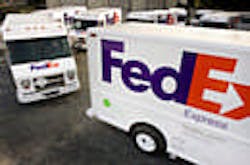Global express delivery company FedEx Corp. is adding 92 trucks retrofitted with diesel-electric hybrid powerplants to its ground delivery fleet – increasing the size of its hybrid fleet by more than 50%, from 172 to 264 vehicles.
John Formisano, vp-global vehicles for FedEx Express, said retrofitting standard delivery trucks to a hybrid configuration is proving to be a cheaper option – though FedEx is still hoping for more government incentives to help further spur sales of new hybrid trucks.
“The conversion of these standard FedEx trucks into hybrids … demonstrates that converted hybrids are a viable, lower-cost option compared to purchasing new hybrids,” Formisano said. “We now need government incentives to end a Catch-22 situation: Production volumes [for new hybrid trucks] are low due to high cost, and costs will only come down with higher production volumes.”
The hybrid retrofit program was developed with Freightliner Custom Chassis Corp. (FCCC) and Eaton Corp., which provided the hybrid-electric systems, and the conversions were completed at FCCC’s Charlotte, NC, plant over the last sixmonths. The standard FedEx trucks used in the retrofit program were 2000 or 2001 models with 300,000 to 500,000 miles on them. The 92 retrofitted trucks will be placed into service in California, primarily in the Los Angeles, San Diego and San Francisco metropolitan areas.
An added benefit of the conversion program is that it reduces pollution and extends the life of the vehicles, helping to eliminate waste production and creating a reduce-and-reuse program, said FedEx’s Formisano.
Despite the higher price tag for hybrid trucks compared to its standard diesel-only delivery vehicles, FedEx is taking the long view with this technology, according to Sandeep Kar, automotive and transportation analyst with research firm Frost & Sullivan.
"It seems that, despite short-term downturns in revenues and operating in a severe recessionary environment, FedEx is not losing focus of its medium- to long-term growth strategy which hinges greatly on reducing operating costs,” Kar said. “What we absolutely must not ignore is that diesel prices will begin their upwardly climb just as soon as the economy recovers.”
He told FleetOwner that FedEx’s business – like every other one in transportation – depends heavily on petroleum-based fuel, and that can be problematic when fuel prices rapidly escalate as they did in 2004.
“The key is you must find ways to insulate the business as best as you can from high oil prices,” Kar explained. “Using hybrids amounts to reduced fuel use and thus reduced fuel costs. The whole idea behind adding hybrids to their fleet is reducing the cost of fuel on their bottom line – that is why FedEx is being so aggressive with this technology.”
FedEx said its new retrofitted hybrid trucks are projected to improve fuel economy by 44%, decrease particulate matter by 96%, and reduce smog-causing oxides of nitrogen (NOx) emissions by 75% compared to its standard delivery trucks.
Overall, FedEx said its hybrid-electric fleet has logged more than four million miles of revenue service since being introduced in 2004. The hybrids have reduced fuel use by 150,000 gallons and carbon dioxide emissions by 1,521 metric tons, which is equivalent to removing 279 cars from the road annually, said FedEx.
About the Author
Sean Kilcarr
Editor in Chief
Sean Kilcarr is a former longtime FleetOwner senior editor who wrote for the publication from 2000 to 2018. He served as editor-in-chief from 2017 to 2018.
